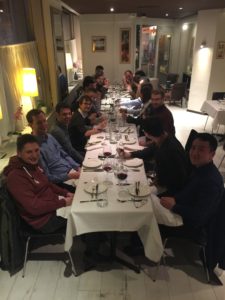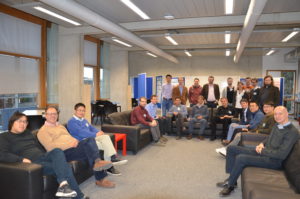CECAM-HQ-EPFL, Lausanne, Switzerland, 08-10 November 2017
Organizers: Igor Ying Zhang and Matthias Scheffler (Fritz Haber Institute of the Max Planck Society (FHI), Berlin, Germany).
Sponsors: CECAM, Psi-k and Fritz Haber Institute of the Max Planck Society (FHI), Berlin, Germany.
Summary
The workshop “Quantum-chemistry methods for materials science” was held at Lausanne, Switzerland from Nov 08th to 10th 2017. In total, 22 participants from Europe, USA, and China attended the workshop. The workshop stimulated an interdisciplinary exchange of ideas and knowledge about the development of advanced electronic-structure methods transferring from chemistry, solid-state physics, and materials science.
The electronic-structure theory is the foundation for many developments and investigation in these fields and the corresponding methods development drives progress. Despite its small and intimate scale, the workshop will have a lasting impact on materials science, because the description of many novel materials of experimental and/or industrial interest has been out of the capability of widely used density functional approximations, while the quantum-chemistry methods have great potential to handle the complex many-body electronic correlation correctly. The workshop reviewed the current state-of-the-art, the challenge and the future of using quantum-chemistry methods in materials science and inspired new avenues for more accurate approaches and computational more efficient implementations that will facilitate future discoveries.
Description
The workshop began with presentations on the development of sophisticated electronic-structure methods in materials science (First two sessions, 14:30 -18:00 on Nov 8th and 9:00 – 12:00 on Nov 9th ). Georg Kresse and Juerg Hutter presented the analytic gradient implementation of advanced electronic-structure methods in VASP and CP2K, respectively. Numerical convergence of quantum-chemistry methods for solids was discussed comprehensively by Denis Usvyat using Gaussian-type basis functions and by Xinguo Ren in the numeric atom-centered basis framework. Andreas Gruneis gave an overview over their recent effort to improve the computational efficiency and numerical stability of coupled-cluster theories using the plane-wave basis functions. Beate Paulus’ talk then focused on the application of quantum-chemistry methods and also density-functional methods to graphene-based systems. These talks cover all the state-of-the-art developments in the field and thus sparked a heated discussion in these two sessions. By comparing the implementation of quantum-chemistry methods in different numerical frameworks and code packages, it has led to the consensus on the challenges of using quantum-chemistry methods for solids, including the slow basis-set convergence issue, the large finite-size error in the reciprocal space, and the expensive computational cost together with a huge memory consumption for large systems. These challenges have been significantly impeding the popularization of accurate quantum-chemistry methods in materials science.
In the following two sessions (14:30 -18:00 on Nov 9th and 9:00 – 12:00 on Nov 10th), the experts from quantum chemistry shared their wisdom to solve these pressing challenges in simulating finite molecules. Edward Valeev introduced his recent work on the explicitly correlated F12/R12 approach, which has been demonstrated to be very effective to reduce the basis-set error in quantum-chemistry methods for molecules. Frank Neese, Fred Manby, and Xin Xu presented their contributions to significantly enhance the computational capacity of quantum-chemistry methods towards large and complex molecular systems, including the uses of domain-based local pair natural orbital (DLPNO) methods, embedding algorithms, and the force-based extended ONIOM approach to realize linear scaling and robust performance of these quantum-chemistry methods for molecules. Ali Alavi’s talk focused on the most accurate quantum-chemistry method, the full configuration interaction method in the quantum Monte Cario framework and its connection to the fixed-node DMC approach. Garnet Chan introduced their new electronic-structure package that allows for the coupled-cluster calculations of both molecules and solids on an equal footing.

After lively discussions in these two sessions, these current progresses in quantum chemistry found their values in materials science, which highlights the importance of deepening the coalescence of two communities to solve the timely challenges of using quantum-chemistry methods for solids in the future.
We organized a nice social dinner on Nov. 9, which complemented the scientific program, by promoting further exchange among the organizers, the invited speakers, and the participants.
List of invited talks
- Georg Kresse (Univ. Vienna): Analytic gradients for the RPA: using the relation between total energies and self-energies
- Juerg Hutter (University of Zurich): MP2, RPA and GW within the Gaussian and Plane Waves Method
- Denis Usvyat (Humboldt-Universität zu Berlin): Wave-function-based methodology as a route to controllable accuracy in solid state applications
- Andreas Grüneis (Max-Planck-Institute for Solid State Research, Germany): Recent progress in applying coupled cluster theories to the study of ground and excited state properties of solids
- Beate Paulus (Free University Berlin): Electron correlation effects in graphene-based systems
- Xinguo Ren (University of Science and Technology of China): Periodic RPA and GW within a numeric atom-centered basis framework
- Edward Valeev (Virginia Tech, USA): Recent work on reduced-scaling explicitly correlated many-body methods
- Fred Manby (University of Bristol): Multiscale embedding methods for accurate quantum chemistry of complex systems
- Garnet Chan (Caltech, USA): Reduced scaling methods for materials
- Xin Xu (Fudan University, China): Embedding approaches for large complex systems, including the extended ONIOM method XO and the DCMB method
The workshop booklet, the program with the abstracts of the talks and the posters, and some supplemental materials can be found on the official workshop’s webpage: https://www.cecam.org/workshop-1387.html.

